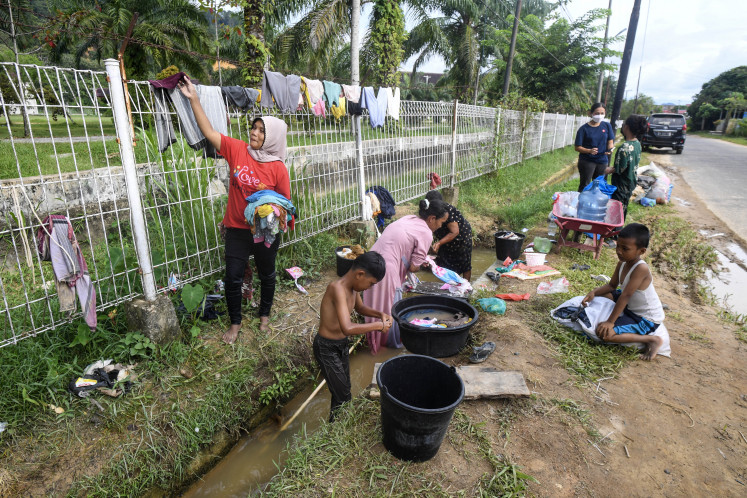Popular Reads
Top Results
Can't find what you're looking for?
View all search resultsPopular Reads
Top Results
Can't find what you're looking for?
View all search resultsFintech Talk: Fintech potential in deepening capital market penetration (Part 1)
Change text size
Gift Premium Articles
to Anyone
F
or most Indonesians, investing in the capital market is still a relatively uncommon option. Many of them consider capital market investment as challenging, not only because it involves many complicated terms but also because they think that it requires huge capital while at the same time bringing a high risk.
The low public participation in the capital market is reflected in the capital market literacy index, which stood at between 5 and 6 percent, far lower than the literacy index for banking (21.8 percent), insurance (17.1 percent), pawn loans (14.9 percent) and consumer financing (9.8 percent). The capital market inclusion index is even lower at 1.1 percent.
(Read also: The emergence of fintech: disruptive or collaborative?)
Emergency situation
Data from the Indonesian Central Securities Depository (KSEI) show that Indonesia, as of Dec. 20, 2016, had 886,574 capital market investors. The figure increased from 434,107 in 2015 and 364,465 in 2014. The increase has been partly attributed to the massive campaigns organized by the government and financial regulators — KSEI, the Indonesian Stock Market Clearing House (KPEI), the Indonesia Stock Exchange (IDX) and the Financial Services Authority (OJK) — as well as Bank Indonesia and the Finance Ministry, which launched the tax amnesty last year.
Despite the rise, the number of capital market investors in Indonesia only represents 0.35 percent of the country’s total population. This is significantly lower than Malaysia and Singapore, whose investors represent 12.8 percent and 30 percent of the national population, respectively. The IDX is targeting to attract 1 million new investors per year while the Indonesian Association of Mutual Fund Managers (APRDI) expects to see Indonesia have 5 million mutual funds investors. Putting aside the ongoing tax amnesty, the current achievement shows that they are still far from reaching their target.
In terms of investors’ activities, data from the KSEI show that less than 20 percent of registered investors are actively making a transaction at least once in a month. While this remains subdued, the number of this kind of investors has increased from approximately 57,000 clients (13 percent of the number of Single Investor Identification/SID holders) in 2015 up to 147,000 clients in 2016 (17 percent of SID holders).
This shows that there are a number of things that need to be done, including the needs to increase our domestic investors’ base by 1-2 million people per year and to encourage customers’ active participation so that more than 30 percent of existing customers can make at least a transaction per month.
Capital market potential
Indonesia’s capital market has a huge potential to attract more local investors, create a more inclusive environment for investment and promote mutual funds savings. Currently, 60 percent of our bond market is controlled by local investors, while the mutual funds market, which is dominated by stock-based products, sees local investors make up some 45 percent of the market. Meanwhile in the stock market, only 35 percent of investors are locals despite the relatively high transaction values, which stood at Rp 5,800 trillion in 2016 (US$429.2 billion).
There are currently 75 investment management companies that offer thousands of mutual funds savings products based upon shares, bonds or deposits; 100 securities firms, which serve as intermediaries to the public that wish to invest in micro, small and medium enterprises (MSMEs), or publicly listed companies, supported by online stock trading platforms, such as HOTS, MOTS and IPOT, and a number of start-ups in the stock market sector that provide services for 886,000 clients in Indonesia.
For investment in the form of bonds, Indonesia currently still relies on banks and securities firms that sell retail government bonds (ORI) and retail sharia bonds (SUKRI). In this sector, electronic services to ease investment are still being developed, with a particular aim to ease the circulation of government bonds.
Paradigm change
Market actors and other stakeholders are aware of the need for a change in the community’s mindset on the importance of capital market investment. Although there are plenty investment-based financial products in circulation, many of them do not come up with proper education for customers, by, for example, promoting a product’s high return of investment in the past as a guarantee for future yields.
Moreover, it must be acknowledged that our stock market players have yet to introduce an out-of-the-box marketing communication strategy. In order to expand the base of customers, capital market players must take a more practical approach that is more suitable with the mindsets and lifestyles of Indonesians. This approach must extend appropriately to the needs of various segments within the community, such as MSMEs, professionals, youth investors and even housewives, by providing applicable illustrations supported by attractive visual aids.
The emergence of new players in the capital market ecosystem, including fintech companies, can provide huge opportunities to expand the outreach of the industry. New innovations, like the introduction of “supermarket digital” for mutual funds products by Bareksa, have allowed prospective customers to better assess their options among a large variety of products. Meanwhile, the introduction of the so-called sociotrading model, such as OlahDana, does not only offer virtual share simulation, but also functions as an actual investment platform to interact with competent mentors in their fields, in an effort to attract the public’s appetite to invest in the capital market.
The article is the first part of two articles











